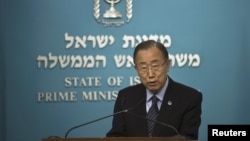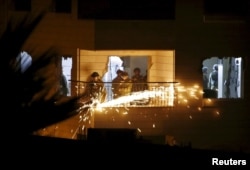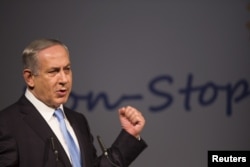United Nations Secretary-General Ban Ki-moon on Tuesday warned against any misuse of force as he met Israeli Prime Minister Benjamin Netanyahu in Jerusalem in a bid to calm nearly three weeks of Palestinian unrest.
Ban also spoke of the danger of allowing an escalation "into a religious conflict with potential regional implications," and urged efforts to ensure that does not occur.
The U.N. secretary-general told reporters that "security measures can be counterproductive if they are applied without special efforts to defuse the situation before people lose their lives."
Israeli security forces have faced accusations of excessive force against Palestinians in the current wave of violence.
At least eight Israelis and more than 40 Palestinians have died during weeks of street violence that Palestinian officials have linked in part to increasing Jewish encroachment at the east Jerusalem holy site known to Muslims as the al-Aqsa mosque and to Jews as the Temple Mount. Israel has adamantly denied Palestinian claims that it intends to take over the holy site.
Ban also said he remains deeply troubled by Hamas and Islamic Jihad praising Palestinian attacks against Israeli Jews and expressed his concern over the "inflammatory rhetoric" to Palestinian Authority President Mahmoud Abbas.
Netanyahu, in turn, accused Abbas of sparking the current wave of terror against Israel by joining Islamic State and Hamas in claims that Israel is threatening the al-Aqsa Mosque. He called the claims a lie, saying "we vigorously protect holy sites, we keep the status quo. It is the Palestinians who violate the status quo by bringing explosives into the Temple Mount and stopping Jews from visiting," he said.
Under long-standing arrangements, Islamic religious authorities administer al-Aqsa. Israel allows Jews to visit but not pray in the compound in Jerusalem's walled Old City, which it captured along with other parts of east Jerusalem and the West Bank in the 1967 Middle East war.
Ban, whose trip was announced in Israel only hours before his expected arrival, met with President Reuven Rivlin earlier Tuesday. He will see Abbas in the West Bank city of Ramallah on Wednesday, Palestinian officials said.
Ahead of the trip, he released a video message to Israelis and Palestinians saying he understands the frustrations and concerns of both sides and urging everyone to oppose terror and incitement.
Ban called on Palestinian leaders to use the energy of their people in a peaceful way, and for young Palestinians to demand that those leaders as well as ones from Israel and the U.N. make progress on a political solution.
"I am not asking you to be passive, but you must put down the weapons of despair," he said.
The U.N. chief said the way for Israelis to achieve sustainable peace and safety is not through walls, checkpoints and harsh responses by security forces, adding that both sides need to recommit to pursuing a two-state solution.
U.S. Secretary of State John Kerry, who spent weeks shuttling between Israeli and Palestinian leaders before peace talks collapsed last year, also plans to hold his own discussions this week in hopes of calming the situation.
Israeli security forces on Tuesday arrested Hassan Yousef, a leader of the militant group Hamas, in the West Bank. A military spokesman said Yousef had been "inciting and encouraging attacks against Israelis."
Israeli forces also demolished the West Bank home of a Palestinian militant who last week rammed a car into a bus stop and then got out and stabbed people, killing a woman and wounding two others. A security guard shot the militant dead.
Earlier this month, Netanyahu called for speeding up demolitions of terrorists' homes, boosting the security presence in Jerusalem and the West Bank, and for authorities to expand the jailing of terror suspects without trials in an effort to stem violence.



